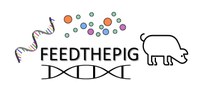THE PROJECT

Sustainability in pig farming involves how animals are raised, the amount of resources used, animal welfare, the profitability of the farm, and, above all, its efficiency. All those elements determine the perception of farming by society and its impact on the environment. As we cope with fewer available resources and increasing feeding costs, improving feed efficiency (FE) has become a crucial aspect of sustainable farming. Selecting genetically superior pigs with improved FE is a strategy to reduce the amount of feed needed to produce meat and to reduce environmental wastes and emissions. However, FE is a difficult-to-measure trait, and genomics on traditional quantitative traits like FE does not guarantee the accuracy that is needed for an effective selection strategy. The goal of FEEDTHEPIG is to dissect FE in pigs taking advantage of metabolomics, transcriptomics and genomics to develop new strategies of selection that will improve the sustainability of the Italian pig production value chain. The project will focus on the two key breeds used for PDO dry-cured ham production, Italian Large White and Italian Duroc.
Funded by the European Union - NextGenerationEU under the National Recovery and Resilience Plan (PNRR) - Mission 4 Education and research - Component 2 From research to business - Investment 1.1 Notice PRIN 2022 PNRR (DD N. 1409 del 14/09/2022), proposal code P2022FZMJ9 - CUP J53D23018310001 .
The Feedthepig project involves the Department of Agro-food Sciences and Technologies of the University of Bologna and the Department of Comparative medicine and food Sciences of the University of Padua and lasts 2 years (2023-2025)